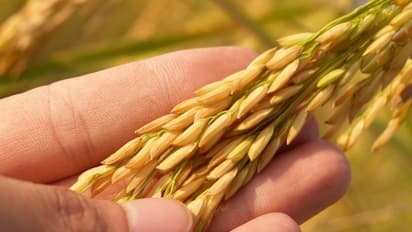Drought-tolerant, nutrition-rich, disease-resistant: PM Modi to unveil 35 new crop varieties today

Synopsis
These special varieties also include crops that take on the anti-nutritional factors found in some crops that adversely impact human and animal health.
Farmers in India will on Tuesday get access to 35 new crop varieties with special traits that have been developed to address the twin challenges of climate change and malnutrition.
The crop varieties developed by the Indian Council of Agricultural Research will be unveiled by Prime Minister Narendra Modi at 11 am via video conferencing.
The climate-resilient and nutrient-rich crops, which were developed this year by the ICAR, include:
1) Drought-tolerant variety of chickpea
2) Wilt and sterility mosaic resistant pigeon pea
3) Early maturing variety of soybean
4) Disease resistant varieties of rice
5) Biofortified varieties of wheat, chickpea, quinoa, buckwheat, winged bean, pearl millet, maize and faba bean.
These special varieties also include crops that take on the anti-nutritional factors found in some crops that adversely impact human and animal health.
A PMO statement cited some of the varieties, which include the Pusa Double Zero Mustard 33 -- first Canola quality hybrid RCH 1 with <2% erucic acid and <30 ppm glucosinolates -- and a soybean variety free from two anti-nutritional factors namely Kunitz trypsin inhibitor and lipoxygenase.
The climate-resilient crop varieties are expected to greatly help the farmers increase their income. The bio-fortified crops can withstand salinity, disease, insects pests, drought and flooding.
The new varieties will help India achieve nutritional security.
The government has been promoting bio-fortified varieties to address malnutrition by reintroducing traditional food products like millet and cereals in the people's diet. Besides, September is observed as 'Poshan Mah' (nutrition month).
So far, over 70 bio-fortified food crops have been released for cultivation.
Stay updated with the Breaking News Today and Latest News from across India and around the world. Get real-time updates, in-depth analysis, and comprehensive coverage of India News, World News, Indian Defence News, Kerala News, and Karnataka News. From politics to current affairs, follow every major story as it unfolds. Get real-time updates from IMD on major cities weather forecasts, including Rain alerts, Cyclone warnings, and temperature trends. Download the Asianet News Official App from the Android Play Store and iPhone App Store for accurate and timely news updates anytime, anywhere.